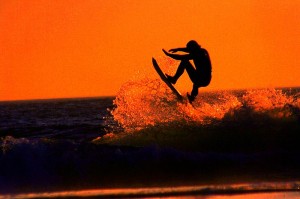Outside of the actually sport, the word “surfing” seems to suggest something that is easy and effortless. (“I’ve been eating nachos and channel surfing all afternoon.” “Those kids spend all night surfing the web.”)
This is odd because the sport of surfing strikes the non-surfer (we are flatlanders; we are non-surfers) as anything but effortless and easy. It strikes us as a particularly demanding physical exercise that requires the strength and agility of a jungle cat. And the resilience to take some pretty serious jerks and twists and the occasion interaction with a big heavy board flipping wildly in the churning water.
So it seems odder still that surfing should have what appears to be such a large and vocal codger cohort. You can see it in blogs like surfers over 50 and Oceanautic Adventures. Or in the wonderful article Surfing for Life in September’s Healthy Aging Magazine. The author, San Francisco gerontologist (and longtime surfer) Roy Earnest, knows his material. He’s also a coproducer of the movie Surfing for Life. which profiles ten surfers—men and women—who kept riding the waves into their later years. In some case, much later: one of the surfers profiled is John H. “Doc” Ball, who was still surfing (in California, without a wetsuit) at 94 when he passed away in 2001. And Doc Ball isn’t the only 90-year-old featured in the movie.
If other sports don’t have similarly gray-haired proponents, they should expect them soon, Earnest says:
“The impact of the age wave and wellness movements will continue for many years to come. There is at present an irresistible demographic and societal groundswell for successful aging, and surfers will help redefine what it means to be an elder. The surfers now over 60 are pioneers, showing us what is possible and prompting many of us to re-consider our own futures in a more hopeful way. Eventually, surfing and many other aspects of active living will lose their exclusive connection to youth.”
If we knew surfing argot, this is where we’d insert a phrase that means “Well said, sir.” But we are flatlanders.
Photo by Mila Zinkova (http://home.comcast.net/~milazinkova/Fogshadow.html) via Wikimedia Commons










